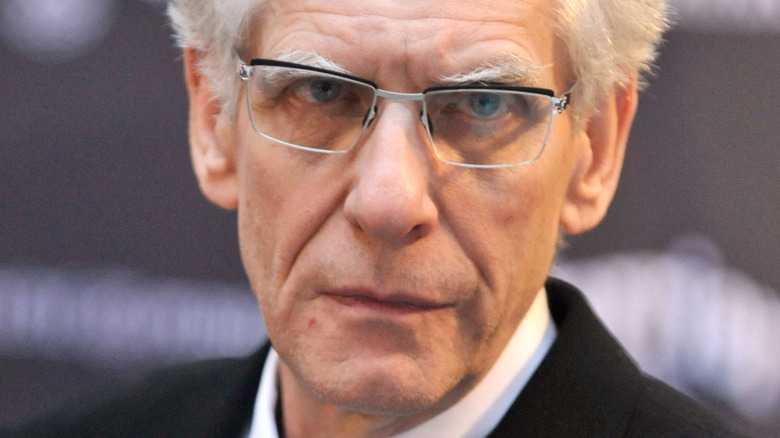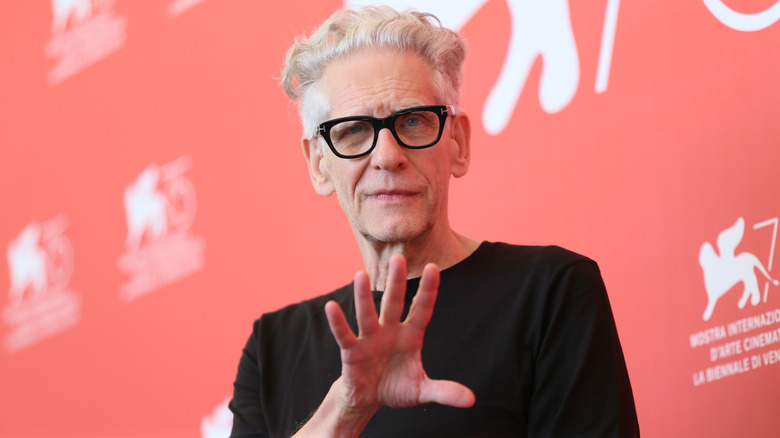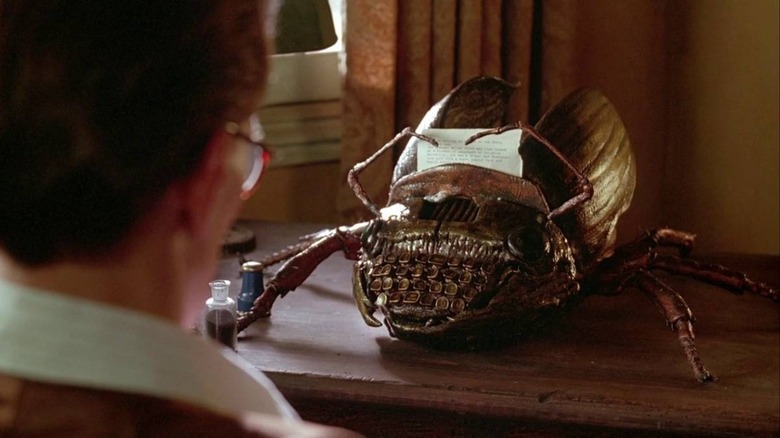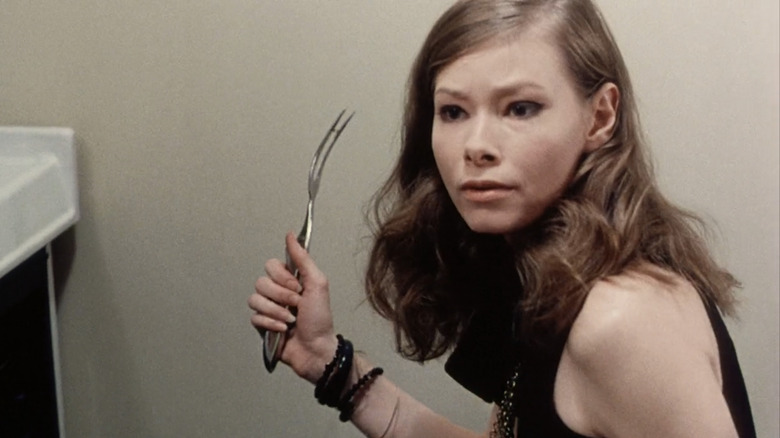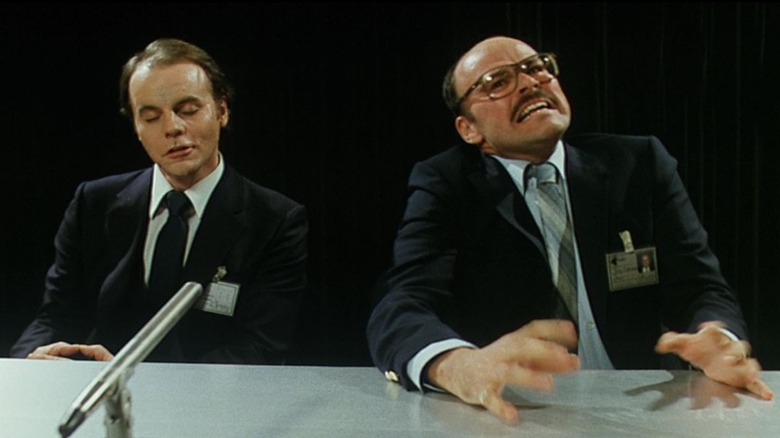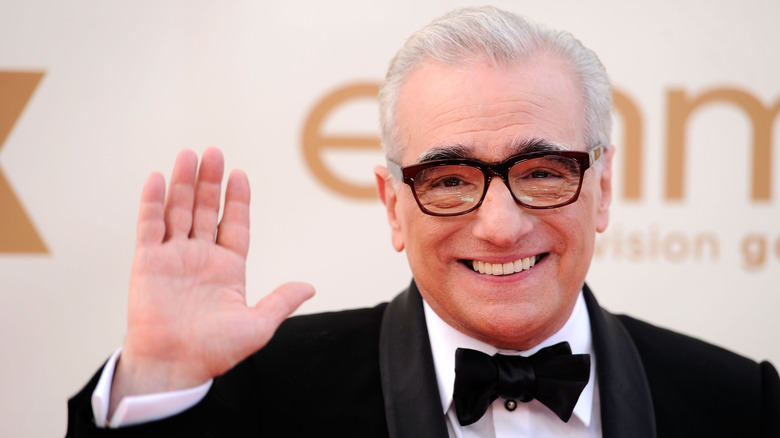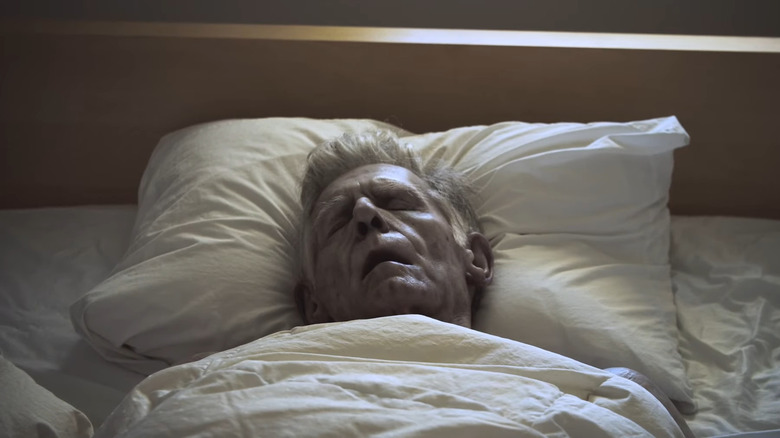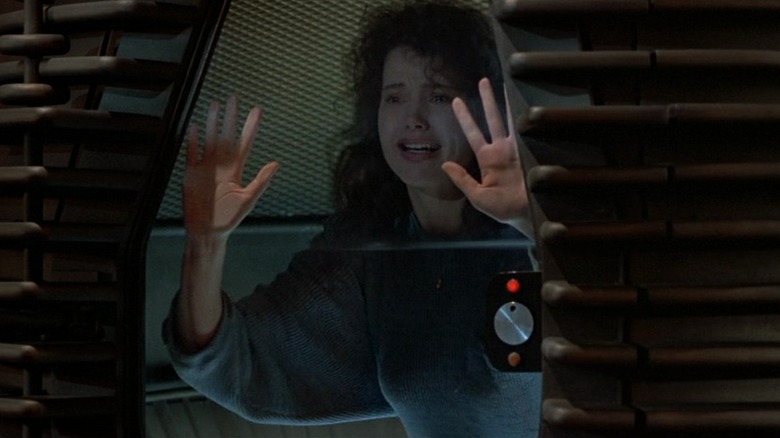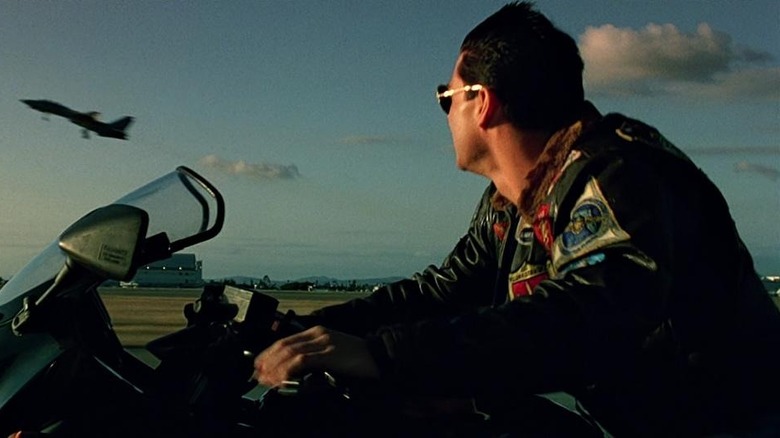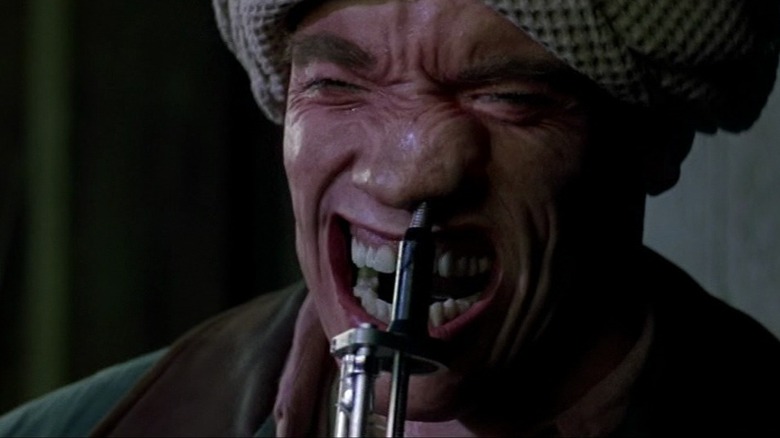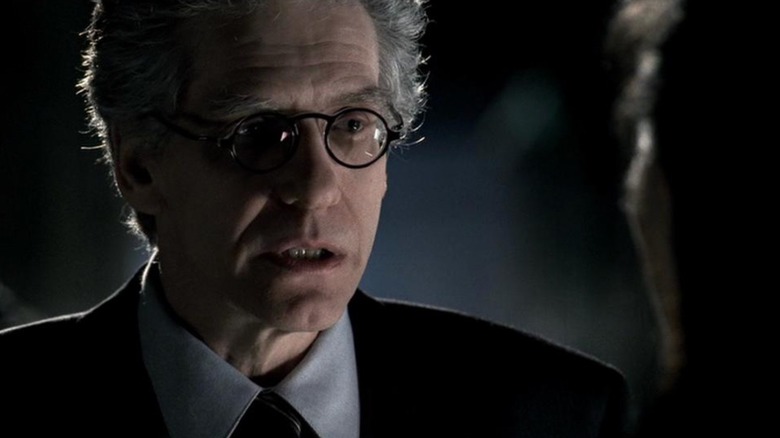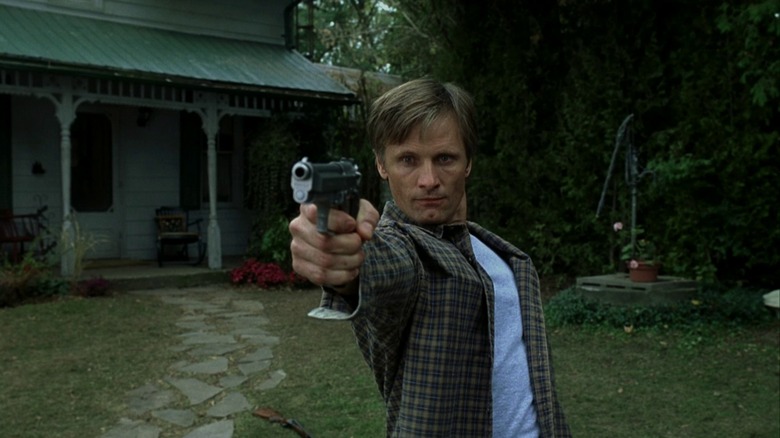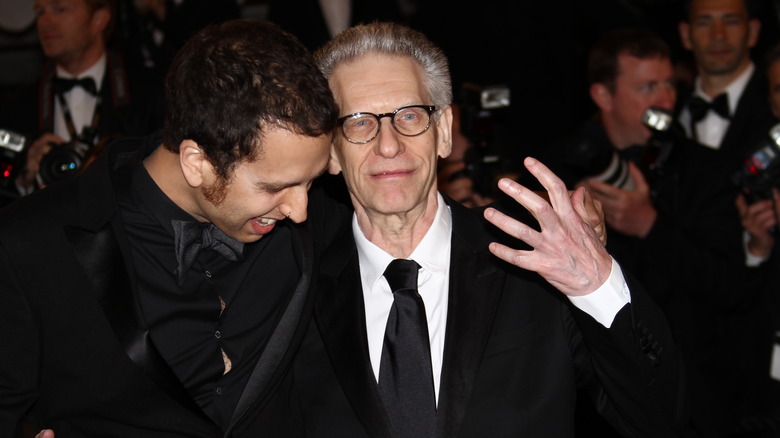The Untold Truth Of David Cronenberg
There are few other characters in film history quite like David Cronenberg. He's done trashy B-horror like "Scanners" and "The Brood," highbrow historical films like "A Dangerous Method" and "M. Butterfly," blockbuster hits like "The Fly," and challenging journeys into the depths of perversity like "Videodrome" and "Crash." Few filmmakers can claim to have created a whole genre singlehandedly, but it's doubtful the concept of body horror would exist without the mutilations and transformations that run through Cronenberg's films. Certainly, there's a reason anyone else exploring those themes eventually finds someone calling them "Cronenbergian."
And while this fascination with the strange status of human beings as self-aware pieces of slowly decaying meat follows him throughout his filmography, he's proven he can apply his sensibilities in everything from horror to gangster films to modern Westerns to medical dramas. Plus, he can meld those sensibilities with a who's who of the most celebrated writers of the 20th century, including Stephen King, Don DeLillo, William S. Burroughs, and J.G. Ballard.
The director's been working over half a century, from his self-financed underground films to his current status as filmmaking elder statesman. Like anyone with such a long and distinguished career, Cronenberg has accumulated a collection of stories as intriguing as the ones he tells on screen. Here are a few of the most fascinating.
Cronenberg taught himself to make movies from the encyclopedia
The son of a journalist, David Cronenberg told The Flashback Files, "It was almost accidental that I became a filmmaker out of curiosity. I was interested in technology, so I started making films."
In "Cronenberg on Cronenberg," he goes into more depth about how he fell into filmmaking. At the time, there were no film schools in Canada — he mentions the closest thing was classes for TV camera operators — but he was inspired by the underground school of New York directors like Andy Warhol. So he taught himself from a source that must seem very archaic to us now in the internet age. He'd pick up the encyclopedia ("We didn't have Wikipedia then"), look up subjects like "camera, lens, sound," and teach himself to work the equipment with the information that he had. In the aforementioned interview, he muses on how much things have changed, describing all the technology he had to work with as "all those things people don't have to worry about now with video, or you could do that with your cell phone."
That experience may reflect in his early adoption of video tech, and he says that while he has many friends in the field who are nostalgic for analog film and devoted to preserving it, all he really misses is the smell of Kodak film stock. He says if he could just get that as an air freshener, digital video would be perfect.
He wanted to be a scientist
Before he took up filmmaking, Cronenberg had his eye on a wildly different career path that nevertheless dovetailed with his eventual calling. In "Cronenberg on Cronenberg," he recalls spending most of his youth planning to go into science instead of science fiction. While he never went to film school, he did spend a year at the University of Toronto studying organic chemistry. That may not have led to a career in medicine, but it certainly provided decades of inspiration for his body-obsessed films. Recalling his first commercial movie, "Shivers," where a nymphomania-inspiring parasite gets loose in an apartment building, he even says, "It was very natural for me, in a way, to make a film that was in some ways like a science experiment."
Cronenberg also mentions one specific area of biology that had fascinated him from his early days. "I thought I would be ... an entomologist," he says. "I was very interested in insects and insect life. ... I thought, we don't have to go to some other planet to find alien life forms — we have them right here, and they're incredible, and people just don't notice them, but they're fantastic."
That quote shouldn't surprise anyone familiar with Cronenberg's work. "The Fly" is the most obvious example of the director's love of bugs, of course but there's also the insectoid parasite in "Shivers," the arachnid-like protagonist of "Spider," and then there's "Naked Lunch," which reimagines author William S. Burroughs as an exterminator addicted to hallucinogenic bug powder that may or may not explain the transformations of characters and typewriters into bugs.
Cronenberg still has a scar from doing stuntwork on Shivers
The 1975 tale of deadly parasites, "Shivers" may have had a more professional work environment than David Cronenberg's earlier underground films, but it was still made quickly and on the cheap. For one thing, there was no set and no studio. In fact, the cast and crew camped out in the apartment building where they filmed for the duration of the shoot. The budget didn't have much room for safety precautions either.
In fact, it scarred the director for life, literally if not emotionally. His audio commentary (via Film School Rejects) for the movie reveals that he had to pull double duty as a stuntman. In one scene about halfway through, one of the infected attacks a housewife played by Lynn Lowry. Fortunately, she had just been checking on her roast with a carving fork, which she embeds in the attacker's back. Unfortunately for Cronenberg, that wasn't a special effect. Lowry accidentally stabbed him for real, leaving a scar he's still carrying around to this day.
How he got that head to explode in Scanners
In "Scanners," David Cronenberg created what has to be the single most iconic image in his career, when evil psychic Revok interrupts a compatriot's press conference by messily exploding his head. Even if you've never seen "Scanners" or any of Cronenberg's films, you've probably seen this moment in gif form whenever someone online wants to express that their mind has been blown in the nastiest possible way. But how did they achieve that wild effect?
In the documentary "The 'Scanners' Way," makeup artist Chris Walas explains how the crew took a plaster cast of the actor's head, filled it with gelatin, and covered it up with a face made from leftover bits of wax and latex. Then, to give that explosion some extra meatiness, makeup artist Stephan Dupuis remembers shoveling the head full of leftover burgers and other groceries — "caro syrup blood, pieces of gelatin brain, and so on."
But director of photography Mark Irwin explains that once they had the head, blowing it up still posed a serious problem. Cronenberg believed any visible flames or sparks would ruin the impression of purely mental pressure. Effects supervisor Gary Zeller tried to inflate a prop head but concluded, "It just looked ridiculous." Then finally, frustrated with all the other failed attempts, Zeller warned everyone to get off the set and close their windows, and he blasted the head with a shotgun full of kosher salt.
David Cronenberg and Martin Scorsese were both scared of each other
Becoming a celebrity filmmaker can introduce you to a whole world of mingling with the rich and famous. Unfortunately, becoming a famous horror filmmaker can cancel those benefits out. "People confuse you with your work in a very direct way," Cronenberg told The Guardian. "You make scary, horror films, so you must be a scary, horrible person." And he recalled how legendary director Martin Scorsese was "terrified" to meet him.
Scorsese told his side of the story in Fangoria, saying, "I expected someone ... who looked like Dwight Frye as Renfield in 'Dracula,' slobbering for juicy flies. The man who showed up in my apartment in New York looked like a gynecologist from Beverly Hills. We had a pleasant dinner, even though there was a certain tension on my part, probably originating in my expectation that David's veins would pop open and his head would explode."
Scorsese is no stranger to cinematic gore himself, of course, and Cronenberg didn't miss the irony. In his Guardian interview, he remembers responding to Scorsese's anxiety by asking, "You're the guy who made 'Taxi Driver,' and you're afraid to meet me?"
Every death he films is a rehearsal for his own
Media, especially horror media, is often accused of desensitizing viewers to violence. David Cronenberg sees it as just the opposite. As unlikely as a lot of it is, he treats the violence and death in his films with the weight of truth. Rather than avoiding the reality of death, he's found that filmmaking is a way of coming to terms with it, especially as he gets older.
Yet it was near the beginning of his career, when he was promoting "Scanners," that he crystallized his approach, explaining (via "David Cronenberg: Interviews"), "Every time I kill somebody, it's a rehearsal for my own death." He elaborated on that statement more recently for The Guardian, saying, "Every day you read about someone exactly your age who's croaked it, and in many different ways –- sometimes interesting, sometimes not so interesting." He further discussed his thought process on these "rehearsals," explaining that he asks himself, "Well, okay, what would it be like to die this way?"
We have to imagine that doesn't mean he actually expects to die by, for instance, psychic-induced head explosion, turning into a fly monster and merging with a teleporter, shooting himself with a gun that's grown out of his hand, or jamming a pair of scissors through his mouth. Then again, some of his films quite clearly show him dealing with his mortality — most obviously in a short called simply "The Death of David Cronenberg."
Cronenberg saw The Fly as an opera
David Cronenberg's flirtations with respectability in the latter half of his career might seem odd to fans of his early, gnarly B-horror films, but the director has always had more on his mind than just cheap thrills. For instance, his gender-bending adaptation of Giacomo Puccini's classic opera "Madame Butterfly" isn't a departure, just a more obvious expression of an influence that was already present in his biggest horror hit, "The Fly."
"The film was very operatic," he told interviewer Serge Grünberg, "so I wanted a big operatic score." He went to his longtime composer Howard Shore to do the job, but not everyone was on their wavelength. In particular, producer Mel Brooks, better known as the director of "Young Frankenstein" and other comedy classics, had a hard time following Cronberg's vision. Cronenberg recalls showing Brooks the scene of Jeff Goldblum as Dr. Seth Brundle walking to the bar to show off his newfound strength in a gory arm wrestling match. Cronenberg and Shore wanted something dramatic to show Brundle "meeting his destiny." But when Brooks saw it, Cronenberg recalls, "Mel said ... 'The guy is just walking down the street, why is the music so big?'"
Brooks' doubts couldn't stop the movie's success, and years later, Shore got to fully realize Cronenberg's musical vision for "The Fly" when his operatic adaptation premiered in Paris in 2008.
He was offered the director's chair on some of the biggest hits of the '80s
David Cronenberg's early success quickly got Hollywood's attention, and producers courted him for many projects that would become huge hits for other directors, even if most of them are so far out of his wheelhouse it's hard to imagine why they bothered. For instance, he told Variety that the scripts for both "Flashdance" and "Top Gun" landed on his desk. Believe it or not, he said the second option held some interest for him but not enough to commit to the job. As he put it, "It's true that I like machines, I like cars, I like airplanes. But ... directing takes at least two years of your life. If you watch it, it takes two hours. So that's the difference."
Most famously, he turned down the director's chair on "Return of the Jedi." He told Variety he got the phone call at home while he was in the kitchen, and he turned it down then and there. "I said, well, I don't usually do other people's material at that point. I only did movies that I wrote." Ironically, he'd direct his first movie from another writer's script, the Stephen King adaptation "The Dead Zone," the same year "Jedi" premiered. The controversial Cronenberg may seem like an odd choice for a crowd-pleasing action flick, but looking at "Jedi" with that knowledge, it makes a surprising amount of sense. Jabba's palace is filled with the kind of fleshy, goopy creatures — not least Jabba himself, with his slimy tongue and lips coated in nasty whitish drool — that wouldn't look out of place at all in a Cronenberg joint.
Cronenberg got in trouble for making a Philip K. Dick adaptation too much like Phillip K. Dick
Of all the '80s hits he was offered, Cronenberg came closest to making "Total Recall." He told interviewer Serge Grünberg he spent a year working on adapting the story "We Can Remember It for You Wholesale" by the legendary science fiction author Phillip K. Dick, whose work inspired everything from "Blade Runner" to "Minority Report" to "The Man in the High Castle."
But Dick's dark, mind-bending style set off friction in the story team as Cronenberg butted up against cowriter Ron Shusett, who wanted to mold the material into a more conventional action movie. Cronenberg recalls one especially surreal confrontation, explaining to Grünberg, "At one point, he said to me, 'You know what you've done with this draft?' I said 'What?' He said, 'You've done the Phillip K. Dick version.' And he was saying it angrily, like I'd done something terrible." Cronenberg finally went to producer Dino De Laurentiis and put his problems in simple terms: "I don't want to make your movie. It seems you don't want to make my movie."
"Total Recall" eventually ended up in the hands of Paul Verhoeven, the Dutch director of "Robocop" and "Basic Instinct," who managed to thread the needle between Dick's vision and the demands of a crowd-pleasing actioner. Still, it's hard not to wonder what Cronenberg would have done with the material, especially with the mutated population of Mars and the nasty effects of leaving its artificial atmosphere.
Cronenberg wrote all his dialogue for Jason X
David Cronenberg has balanced his directing career with occasional appearances on the other side of the camera, with his gaunt, distinctive features making him a memorable presence in movies like "Nightbreed" and series like "Star Trek: Discovery." This side gig includes a role in "Jason X," the "Friday the 13th" sequel that takes Jason Voorhees into the far future when some scientists decide, for whatever reason, that it'd be a good idea to revive the frozen serial killer. Predictably, he starts slaughtering everyone in sight once he wakes up.
Cronenberg appears as Dr. Aloysius Wimmer, the scientist who puts Jason on ice. The tenth installment in a franchise most critics never liked to begin with might seem like an odd fit for the man who's built a reputation as the thinking man's horror director, but a paycheck is a paycheck, right? Just the opposite — in an interview with The A.V. Club, screenwriter Todd Farmer revealed Cronenberg volunteered for the part. When his longtime effects collaborator Jim Isaac took a job on "Jason X," Farmer says, Isaac had "gone to David out of respect and said, 'Do you mind if I use the [effects team] on this?' And Cronenberg said, 'I don't mind at all, but you have to cast me.'"
Once Cronenberg was on set, another crew member warned Farmer that he was rewriting his character's scenes, worried the screenwriter would be offended. Far from it! He says, "I was like, 'That's great! I'm going to get credit for that.'"
He directed the last film to be released on VHS
In the over 50 years he's been making movies, David Cronenberg has seen the industry change in countless ways — the shift from film to digital video, the rise of cable and streaming, the emergence of home video, and the cycle of format changes that came with it. He has an especially close connection with that last one.
"A History of Violence" is a landmark in Cronenberg's career for many reasons — it was nominated for two Oscars and the first of his four collaborations with Viggo Mortensen. "Violence" was at least a big a milestone in the history of home video. The Los Angeles Times reports it was the last major release on VHS as the industry phased out the format for DVD.
There's something fitting about Cronenberg being around for the death of the videotape after he'd turned the technology into the stuff of nightmares 20 years earlier in "Videodrome," where the protagonist grows a VCR in his stomach and the villains jam a pulsating, organlike VHS tape into it.
David Cronenberg's son delayed his film to make room for his dad at Cannes
David Cronenberg has made filmmaking into a bit of a family business. His daughter Caitlin is a professional photographer, and his son Brandon has found success exploring the same themes as his father in movies like "Antiviral" and "Possessor." But family comes before fame, as the elder Cronenberg revealed in an interview with IndieWire.
Recently, father and son were both working on new movies for independent studio Neon. David was directing "Crimes of the Future," an extremely Cronenbergian story about performance artists performing surgery on strange new organs onstage under heavy surveillance by the government's National Organ Registry. Meanwhile, Brandon Cronenberg was working on his own Alexander Skarsgard-starring sci-fi thriller "Infinity Pool" ... which he put on hold to avoid stealing the thunder from the premiere of his father's film at the Cannes Film Festival. David told IndieWire how much he appreciated both his son's gesture and the pleasures of seeing him follow in the family business. "It was really quite sweet," the elder Cronenberg said. "To be shooting at the same time is delicious for a father. I was really very proud."
